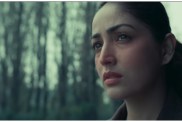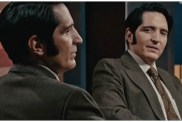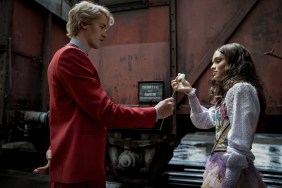A product of the ’60s and one of the more unforgettable figures of the ’70s, Dr. Hunter S. Thompson was mainly known for his writing, from his acerbic political reporting for Rolling Stone (originating the term “gonzo journalism”) to classic novels like “Fear and Loathing in Las Vegas” and “Where the Buffalo Roam,” both turned into movies starring Johnny Depp and Bill Murray, respectively. Even Gary Trudeau paid homage (sort of) to Thompson’s legendary persona with the character Duke in “Doonesbury,” but after being dormant for many years, Thompson–paradoxically a lifelong gun nut despite his liberal writings–shot himself in the head in 2005.
That might have been the end of his story until Oscar-winning documentary filmmaker Alex Gibney (Taxi to the Dark Side, Enron: the Smartest Guys in the Room) decided to tackle a movie about the enigmatic cipher of an author, appropriately called Gonzo: The Life and Work of Dr. Hunter S. Thompson. Narrated by Johnny Depp, reading from some of Thompson’s most famed novels and Rolling Stone pieces, the film covers Thompson’s early days embedded with the Hell’s Angels, his drug-induced bender in Las Vegas and covering the 1972 and 1976 Presidential Campaign, which ultimately turned Thompson into a world-famous celebrity.
ComingSoon.net has now spoken to Alex Gibney three times for all three movies, the last time being before “Gonzo” premiered at the Sundance Film Festival earlier this year and before “Taxi” won this year’s Oscar for documentary. As always, we made sure to leave off with a few words about his next project Magic Bus about the eclectic LSD pioneer Ken Kesey who is briefly mentioned in “Gonzo’s” first act.
ComingSoon.net: Last time we spoke was for “Taxi” right before Sundance and we finished the interview talking about this, which you’ve now finished. Congratulations on the Oscar; you killed a lot of Oscar pools with your win.
Alex Gibney: Thank you. (laughs) I think that’s true, I think that’s absolutely true.
CS: What did you say to Charles Ferguson when you saw him after winning?
Gibney: He was there. I think Charles was expecting to go on stage. I mean look, I’d been executive producer of that film so it wasn’t like I was distant from it, but yeah, I clearly had my heart in “Taxi.”
CS: Who approached you to make a movie about Hunter Thompson or was that something you sought out to do?
Gibney: Jason Kliot and Joana Vicente, people at HDNet films approached me, but also with Graydon Carter because Graydon had been talking about doing a Hunter Thompson film after he died. He had published Hunter and had established a rapport and relationship with the estate. They were looking for a director, and it happened to coincidentally be at a time when he was in the air for me. I mean, obviously he had just died, and I was giving some thought to… I’d read this piece by Frank Rich about Hunter, Jeff Gannon, and the cashiering of Dan Rather. The piece was arguing at a time when former male prostitutes are masquerading as reporters in the White House, we need somebody like Hunter Thompson.
CS: This was around 2005 after you finished “Enron”?
Gibney: Yeah, that’s right. It was around the same time… I mean “Enron” comes out… when did it come out? I know it came out in April, and it would’ve been 2005, that’s right.
CS: So you already had a connection with these producers and they knew what you could do. What kind of connection did you have to Hunter’s work?
Gibney: I didn’t have a particular connection with Hunter. I think they liked the style of the “Enron” film. It ends darkly, but there was a certain amount of humor and playfulness in the film that maybe seemed appropriate for something like “Gonzo.”
CS: But when it was suggested that you make the movie, you must’ve read some of his stuff already.
Gibney: I’d certainly read “Vegas,” and I’d certainly read “Campaign Trail” and “The Derby Story,” and a couple of other pieces. I wasn’t a completist, but I certainly knew and loved Hunter’s writing.
CS: Were you a journalist before you started doing documentaries?
Gibney: I was always in film. I started out after film school, I was a fiction film editor for a while, but then I got frustrated doing that and I tried to get into doing documentaries, but there was a fallow period for a long time. During that period, I was a freelance journalist, but my dad had been a journalist, and two of my brothers are journalists, so it was not unfamiliar to me.
CS: At that time, Anita (Hunter’s widow) was Hunter’s estate because she was still managing the house?
Gibney: The estate is the funny thing. Anita and Juan (Hunter’s son) are the beneficiaries of the estate, but the estate is controlled by trustees. What deals get made, what properties are released, that’s not controlled by Juan and Anita, it’s controlled by the estate.
CS: It seemed like they kept everything in Hunter’s office intact and kept a lot of his letters and films. Were you able to just go in there and use whatever you could find in there?
Gibney: It sounds so simple now, but over time there was a period of trust building, talking to Anita, talking to Juan, getting everyone comfortable with the idea that we would have general access to his house, his archive, his audio recordings, you know, all his stuff.
CS: When you first got the gig, how did you want to start it? Did you want to start by interviewing Hunter’s widow and son, Anita and Juan?
Gibney: Well, I kind of thought a lot had been done about Hunter the wild and crazy guy. I mean Gary Trudeau had this key character for many, many years, really running with that idea. It seemed to me that what had been missed here was that we wouldn’t really care about this wild and crazy guy if he hadn’t been a great writer, so maybe we would find a way to dig into the work, try to find a way of doing a film that would show what a great writer he was and how interesting he was that way. That was one of the ways that we approached making the film, and that’s why we decided that the narration would be composed entirely of his writing. It would be Hunter at the center, but not just a Hunter we happened to find along the way, it would be Hunter’s words.
CS: Obviously, the connection between Johnny Depp and Hunter comes from him starring in “Fear and Loathing.” I didn’t know that he financed Hunter’s funeral ceremony, so was he one of the first people you contacted to narrate it once you started? How did you contact him?
Gibney: We sent him a copy of the film when we were getting close to ready because we had the words and I was reading the temp narration, but we wanted somebody to read it. The person we wanted more than anybody was Johnny, and not just because he was Johnny, a big movie star, but because psychically, I think has a deep connection with Hunter having lived with him at Owl Farm and having shadowed him, also playing him in the movie, he has this connection with him that is deep and forceful.
CS: Did Hunter’s elaborate funeral ceremony already happen by the time you came onto the movie or were you already working on the movie at that point?
Gibney: My first day on the job was to go out to that funeral ceremony and shoot it.
CS: Did you have any contact with Johnny then and talk to him about possibly doing something in the film?
Gibney: Very little. I mean, again I was viewed at the time as kind of the interloper. Okay, we’ll make an accommodation for this guy, but Johnny is a big star, and it’s weird. I remember being in the Hotel Jerome, this big hotel in Aspen, and suddenly it got very quiet, a little bit like the feeling in the water they describe when a shark enters the water. Suddenly, you see these big, tall guys standing around with ear pieces and they’re talking into their cuffs, and then Johnny Depp walks by, and then they all disappear, and then the room noise raises again. It was interesting that his life is in that bubble. Within the context of the ceremony, there was a lot going on and there were all these people that were very close to hunter, knew him intimately. I was this outsider that nobody knew from Adam, and it was a strange way to start because it was such a powerfully emotional period, and everyone was so close to him except for me.
CS: There must’ve been other people that were harder to get for the movie. You have Jimmy Carter and George McGovern and others, and I was pretty amazed who all appeared in this. Did you chase after these people or did you help from others in getting in touch with them?
Gibney: It was a little bit of both. I mean Graydon helped, but there were a couple of people we were surprised we just spoke to and then said “yes” like Jimmy Carter. Jimmy Carter loved Hunter; I’d just forgotten that, or maybe I didn’t even know it.
CS: Was Pat Buchanan always up for it?
Gibney: He did turn us down at first, but then I wrote him a letter arguing that at a time when journalism has become so bifurcated when everyone just hangs out with their tribe–left wing journalists, right wing journalists–you know nobody wants to find out what’s going on across the ideological street, so wouldn’t it be fun to celebrate somebody like Hunter who would talk to anybody? And Pat said, “Yeah, you’re right,” so we got together and I loved talking to Pat, very well-educated guy, ended up quoting “The Great Gatsby” like three or four times.
CS: He had a great moment in the movie also.
Gibney: When somebody rides off on the motorcycle? It is a great moment. It’s one of those wonderful things where thank god the cameraman didn’t stop rolling.
CS: How did you decide which stories to focus on? Obviously, Hunter’s had a very full life and has done a lot of stuff before his death.
Gibney: I think because we’re focusing on the work, it steered us into that period of time when he was in the zone in terms of his talent and his writing which is about ’65 to ’75, that just seemed to make sense, so that gave the film a kind of chronological focus for that period, but we also knew we wanted to start and end at the beginning, so unlike “Enron,” we had a kind of rough structure for the film I think early on, and because we were focusing so much on ’65 to ’75, it seemed like that gave us certain key sequences to look at.
CS: Hunter is very much a product of the sixties and seventies and what was going on back then, so is there anyone today who you think could create a similar fervor, or was that just a different time?
Gibney: It’s a different time and nobody could do it all like Hunter seemingly, he had this blogger sensibility, the ability to cover stuff on the road, but also a novelists capability in terms of his powers of description and also his sense of humor and all of that, but it’s hard to know, there are bits of Hunter in a number of people, I see his caustic humor used at the expense of politicians you know in people like Colbert and Jon Stewart, Matt Taibbi is writing for Rolling Stone now, and there’s are elements of some of the gones of tradition there.
CS: If anyone did any of that stuff now, they’d be fired immediately and never work again. You can’t do stuff like that these days.
Gibney: And Hunter couldn’t be a journalist like that. Everybody’s got to remember, he’s writing for a counter-culture magazine, he’s writing for a music magazine basically, and so that gave him freedom to do what other people weren’t doing, I think now in the blogosphere, people have a little bit more freedom to do what they want to do, but it’s interesting to me that some of these big papers can’t find, if some of these papers survive much longer, can’t find a place for people like Hunter, some extension of the Op-Ed page in the Editorial department, where you can go out and cover stories, but do so in a very personal, opinionated way.
CS: What do you want people to get out of this movie besides informing young people who may not have heard of Hunter or his work? When you spend this much time on a movie, you must have something you want people to get out of it.
Gibney: It’s interesting to see his rise and fall as a writer and how infusive a talent he was and how much of a curious person he was, but I also think that it’s useful to see somebody who didn’t play by the rules, and how important that was, not only how fun it was for us all to watch vicariously, but how important it was in terms of getting the truth out of the situation, not necessarily an accountant’s truth, but what Herzog would call a poet’s truth.
CS: Those times must have gotten into your bloodstream, because you’re now doing a movie called “Magic Bus,” about Ken Kesey and the Merry Pranksters, who were mentioned briefly in “Gonzo.”
Gibney: He was another genre breaker. He was a guy who decided that he wasn’t going to follow the straight and narrow, and when he first does (acid), Kesey, you know in ’64, we’re really still living in the fifties in a way. He just breaks free. One of the interviews we’re listening to now, he talks about God’s cosmic joke, the idea that LSD would be introduced to Americans by the CIA.
CS: Do you think you’ll take a different approach to the movie, maybe get more into the drug culture of the times visually?
Gibney: Yeah, but at the same time, one of the interesting things about the Pranksters on that ’64 bus trip–and they shot a lot of footage on that trip–is how straight it seems from the outside. You have to be inside the hallucination to feel them, and they look like fraternity kids, it’s not that ’68 or ’67 Summer of Love kind of stuff. It’s just a few years before that, but it feels like it’s straight out of the fifties.
CS: You obviously have a lot of projects in the works, even developing some dramatic features. How do you find time to realize all these things that you have in the works? Do you just slowly grind away at them?
Gibney: I’ve got a team that indefatigably supports it, and I’m working a lot all the time. My problem is figuring out when to stop.
Gonzo: The Life and Work of Dr. Hunter S. Thompson opens in select cities on Friday, July 4.










